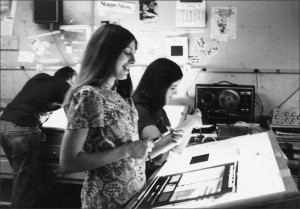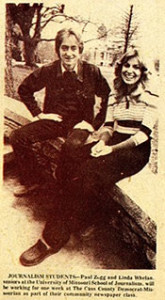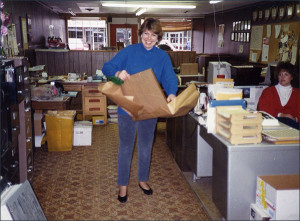Linda Geist
Senior Information Specialist at University of Missouri Extension

Degree(s): BJ '77
Whereabouts: United States, Columbia, Missouri
“You will never be the same as the rest of the world from now on. You will always think differently and process things differently than every one else you know. Welcome to the University of Missouri School of Journalism.” So went the speech professor Hal Lister gave to his introductory news students on the first day of class in 1975.
His words still ring true for Linda Whelan Geist, BJ ’77, who has spent the majority of her career as a community journalist. Decades later, Geist looks at the world with a sense of awe, cynicism, kindness and with an outsider’s perspective, often feeling like she is looking through a lens, one-step removed.
“As a journalist you are part of the world, but you are also not part of it,” Geist says. “When you carry a camera or a notepad, you are not part of the story. You are telling the story.”
Growing Up With a Passion for Journalism
Growing up in Monroe City, Missouri, population 2,500, Geist was a natural fit for a career in community journalism. She began reading the St. Louis Post-Dispatch in the third grade. By sixth grade, she “published” a handwritten school newspaper in her country school and read it to the 30-plus other students in grades first through sixth.

The publisher of the Monroe City News, Michael Sell, BJ ’71, became an early mentor to her after seeing her work as editor of her high school newspaper. He offered her a part-time staff position at the Monroe City News during her high school years.
“At 16, my employer gave me opportunities and experiences most 16-year-olds do not get,” Geist says. “It was not uncommon for people of power to walk through the doors of the newspaper. I was included as part of the staff, and therefore never felt any less at ease talking to the governor than I did the local garbage collector.”
Geist is thankful that Sell mentored her in all aspects of running a paper. She considers herself a writer above all, but she learned everything from how to sell ads and take photos to how to lay out pages. By age 17, she produced her first special edition, writing and photographing most of the news, selling the ads and laying it out. Sell saw potential in Geist and suggested that she attend his alma mater, the Missouri School of Journalism.
Geist headed to Columbia in the summer of 1973. It was the post-Watergate era when many students were interested in pursuing investigative reporting. She remembers the competitive atmosphere of the journalism school during her time there.
Getting to the story before anyone else was always the initial challenge. Geist had a competitive advantage because she owned a car bought with her $1 per hour news office wages. But finding her way to the story wasn’t always easy.
“It was before Google and GPS where you could find a street immediately,” Geist says. “If you knew where a street was, you could land a story and a byline.”

Geist enlisted the help of her neighbor, a veterinary student, who helped her memorize the streets of Columbia. It gave her an edge, and she often was able to get to the scene of a story before her fellow classmates.
Perhaps the biggest challenge of Geist’s college career came when she gave birth to a son as a single mom her junior year. Much of her studying occurred at the laundromat, baby in a pumpkin seat, while cloth diapers washed. Geist still managed to graduate on time.
During Geist’s graduation ceremony, she received the Cowgill Blair Award for the student with the most potential in newspaper publishing.
“I don’t know that I was the best student, but I was among the most tenacious and understood community newspapers better than most,” Geist says.
Heading Home to Be a Community Journalist
After earning her degree, she worked a series of jobs – some in the newspaper business, some in the business world – using her writing skills. However, there was not a day that she did not miss reporting.
“Newspapers were always my first love, my refuge, my safe harbor,” Geist says.
After several years, she returned to her hometown newspaper under her mentor, Sell. By this time Sell had sold the paper to a large corporation, although he remained as publisher. Geist continued to develop her skills under his guidance. In particular, she recalls Sell teaching her how to write strong editorials, which she considers a crucial part of viable newspapers.
“I think that local news and strong editorials are key to newspapers surviving,” Geist says.
It was a skill that came in handy when Sell resigned, and Geist was appointed publisher. She cherished her new role, but it was not without its challenges. Geist found it difficult to work for a big publishing corporation more interested in advertising sales than a quality local news product.
“When they took the ‘news’ out of ‘newspaper,’ it didn’t appeal to me anymore,” Geist says. “A strong news product drives the advertising, not the other way around. It was a big change in the way the industry operated when ownership shifted from local to absentee owners.”
Things came to a head when she and other publishers from the same publishing group were told to tell their staffs they could no longer shop at Wal-Mart because the retailer had pulled its advertising inserts from newspapers.
Sell had instilled a newsroom environment where spirited discussions happened regularly, and employees were encouraged to speak their minds. Following in Sell’s footsteps, Geist took a stand regarding the mandate. She wrote a letter to the corporation head and argued that her employees, some recent college graduates making a meager $8 an hour, could shop wherever they could afford to shop.
Geist’s pointed letter was not well-received and led to the end of her career at the Monroe City News.
Forging Her Own Path
Following her dismissal as publisher, Geist grappled with her next step. Ultimately, she decided to fight back in the only way she knew.
“I either had to go to work for someone else or do something on my own,” Geist says. “Frankly newspaper work is all I’ve ever done, and I was angry. Anger fuels a lot of ambition.”
Ambition in this case meant starting her own newspaper, one that she felt would truly serve the Monroe City community. The decision Geist made to start her newspaper in Monroe City, as opposed to another community, was based in practicality. She wanted to continue living near her extended family and support system, and she knew the ins and outs of Monroe City. Most importantly, Geist knew what she wanted to do, and she knew Monroe City was in need of a quality newspaper.

However, starting a business was an overwhelming task for Geist, and she struggled to balance her time between her paper and her children. It’s a regret she acknowledges now, years later.
“I spent many a night, too many, covering other people’s children’s events when I should have been home with my own children,” Geist says.
Aside from being a mother, being a female business owner brought its own challenges. Geist believes that being a woman made it difficult to secure a small loan to finance her newspaper. Eventually, her father cosigned a note, and she officially published her first edition two months after being fired.
Her family as well as connections she had made through Missouri Press Association helped her. Geist’s sister rented her a room in the building that housed her beauty shop. Her siblings and parents hand-delivered the newspapers to every residence and business in Monroe City during the paper’s first two months. Her family also helped by reporting on the side and tipped Geist off with story ideas.
“They were great cheerleaders,” Geist says.
The bulk of the work launching a start-up newspaper fell back on her, however. She initially worked 100-hour weeks to not only produce news but also to find advertising to support her paper. That meant going to key businesses to ask for their support. Several major businesses pulled their ads from the Monroe City News to give them to the new paper, The Lake Gazette, with its slogan “Hometown News by and for Hometown Folks.” Within six months, the Gazette’s circulation was larger than that of the Monroe City News, and within three years the News folded in its 175th year of publication.
“It’s just not something that happens,” Geist says. “To have started a business that has survived as long as it has, and to do that as a single parent. It’s a pretty big thing.”
Overcoming Small-Town Challenges
Even though Geist worked to maintain an outsider’s perspective as a journalist in Monroe City, she was still a stakeholder in the community because she lived there.
“The school bond issue affects your children,” Geist says. “The proposed tax affects your real estate taxes and budget. Most reporters do the best they can to objectify issues, but it’s harder in a small town because you are so passionate and connected to your town.”
She sometimes struggled writing about the people she knew in the close-knit community.
“Editorial writing and court reporting are harder when you are in a small town,” Geist says. “You run into council members, legislators, school board members and citizens at the grocery store or at your kid’s school sporting event. Sometimes the social repercussions for yourself and your children are difficult. And sometimes you eat your words when you’re wrong.”
Geist’s ability to turn adversity into strength came in handy in 2006 when a tornado destroyed her newspaper building and many others in Monroe City. She and the staff published the newspaper on time that week and produced two special editions that same month after setting up temporary headquarters once again in her sister’s beauty shop.

The following year, the newspaper rebounded with a newly remodeled building and published a cookbook, a hardback history book and two special editions. It also hosted an open house to kick off the town’s sesquicentennial celebration. Geist personally supervised the building project.
Geist reflects back on the “glory years of small towns” and how things changed over the 14 years she owned the Lake Gazette, specifically with local advertisers. Over that time, many of the advertisers that supported her for many years no longer lived in Monroe City. Instead, many businesses became corporately owned. That meant the people who had the power to decide where to advertise lived in another town. Geist could no longer walk into a business and ask the company to advertise with her paper. The simplicity of small town communication was lost.
In this way, newspapers mirrored small town businesses, Geist says. Corporations bought up local papers as investments. Corporate managers focused more on revenue generation than news, a trend that continues.
“We’re seeing a lack of quality because we’re hiring people based on how low we can pay them rather than for their knowledge and experience,” Geist says. “We see circulation numbers dipping because of lack of quality news content, not because people have lost their thirst for local news.”
And, of course, social media has changed the entire landscape of how newspapers operate, she says.
Geist also says it was common to see corporate newspapers not giving back to the community in the same way that small town newspapers did. At the Lake Gazette, she gave money to almost every community organization and event that came in the door.
“We were part of the town,” Geist says. “If you were doing your job as a small town journalist, you were giving back a huge portion of what you make to the town. It’s important to be a good citizen in your community.”
The change in small town business operations was one factor in her decision to sell the Lake Gazette. However, the real turning point for Geist was when she covered a drug raid at a house in Monroe City. She went along with the police to take photos, but she did not expect it to change her career path. Geist remembers seeing the woman being arrested and her two small children crying, screaming and clinging to her legs as she was handcuffed and pulled away.
“The cries from the children that night killed my desire to cover those types of events,” Geist says. “I knew at that point that I could no longer do the job that needed to be done.”
Geist took pride in reporting the difficult and even dark events of a small town with no exceptions. She acknowledges that it is a worrisome burden to constantly weigh what should be told and what should be held. After the night of the drug raid, that burden became too much for Geist, and she began thinking it was time to sell the Lake Gazette. She eventually followed through and sold the paper in 2011.
Reflecting with Pride
In her post-newspaper life, Geist works as the senior information specialist for the University of Missouri Extension. She rents an apartment in Columbia during the work week and returns home to Monroe City each weekend. While she enjoys working for MU, she admits struggling to fit in to an eight-to-five job after years of unpredictable newspaper hours.
“If I get up in the middle of the night and the words are coming, then that’s when I’m going to write,” Geist says.
Because of the non-compete clause Geist signed when she sold her paper, her work location and type are restricted until July 2016. While Geist isn’t sure if she will return to a career as a newspaper journalist, she knows she will always have a true passion for community newspapers.
“When I go home to an event I still feel the need to cover it, I know these are still my people and this is the work I miss and love,” she says.
She has a true sense of gratification from her work as a community journalist in Monroe City.
“I like knowing that you were making a difference,” Geist says. “You leave a mark on the town, and the town leaves a mark on you. I think by being a strong reporter I left the town a better place.”

About the Author: Piper Salvator is a senior at the Missouri School of Journalism and a member of the Honors College. She plans to graduate in May 2016 with an emphasis in strategic communication and a minor in business. Salvator has held public relations internships for nonprofit organizations and plans a career in advertising or public relations for a nonprofit. Salvator is from Boulder, Colorado.
Updated: December 21, 2015